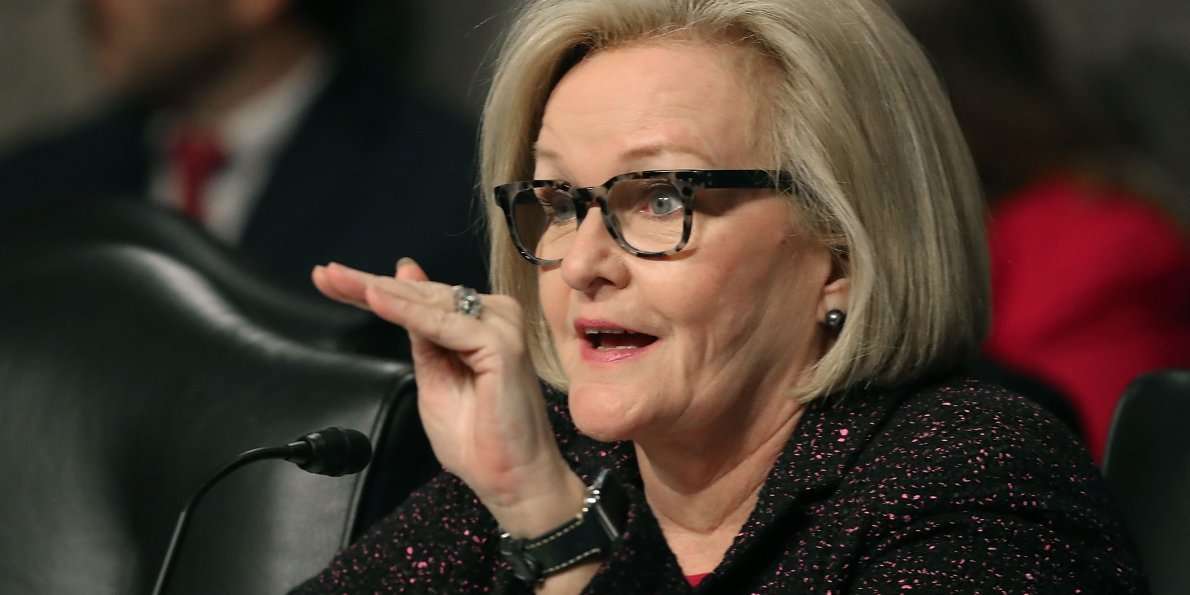Democratic senators have gathered enough support to force the Senate to vote on a resolution to restore net neutrality.
They need only a simple-majority vote to approve the resolution.
While that's a long shot, there's a political reason for them to force a vote: It could make Republican senators take a public stand on this hot-button issue.
On Monday, Sen. Claire McCaskill of Missouri announced she was the 30th senator to call for the Senate to vote on whether to restore net-neutrality rules.
Thirty is the "magic number of cosponsors needed to get a #NetNeutrality vote in the full Senate," she tweeted.
Net neutrality means internet service providers, like your cable company, can't do things like slow down or block certain websites or apps â like Netflix or Google, or those from their competitors â or charge you more to access them.
The rules were put in place in 2015, during the Obama administration, to keep the people who own the wires that bring you the internet â for which you pay a monthly fee â from giving their other businesses a competitive advantage.
But last month, the Republican-led Federal Communications Commission voted to repeal net-neutrality rules, despite an outpouring of comments from those who believe that handing such control over to cable companies and other ISPs is a bad for everyone but the ISPs.
Soon after the vote, Democratic Sen. Edward Markey of Massachusetts, a member of the Commerce, Science, and Transportation Committee, said he planned to introduce a resolution under the Congressional Review Act to allow the Senate to vote on whether to restore the rules.
As you might expect, all the senators sponsoring the resolution are Democrats (except for Sens. Bernie Sanders and Angus King, independents who caucus with the Democratic Party).
But forcing a vote alone isn't enough to restore the rules â Democratic senators can approve the resolution with a simple-majority vote, so at least two Republicans would have to vote to support the effort, too. Then it would head to the House and, if approved there, the president's desk.
But the brilliant part is that even if everyone votes along party lines and the resolution fails, senators will have had to take a public stand either way. And those Republicans who voted against it will have handed a bit of political fodder to opponents ahead of the midterm elections this fall.
Activist groups like Fight for the Future have instituted campaigns like Vote For Net Neutrality, which asks people to vow to vote against lawmakers who oppose the resolution to restore the 2015 rules. But of the 34 Senate seats up for grabs this year, 25 are held by Democrats or independents.
But activism has worked in the past on this issue. An outpouring of support from internet communities like Reddit was a big part of the reason the FCC adopted the net-neutrality rules in the first place.
And senators may be aware that there's a lot of anger over this issue.
Ajit Pai, the chairman of the FCC who led the repeal effort, abruptly canceled his appearance at CES this week, reportedly because he had received death threats. This is the first time since 2009 that the agency's chair hasn't appeared at the tech industry trade show.
So from the Democrats' point of view, winning this battle is a long shot â but there's every reason to try.

RondaArousedMe on January 9th, 2018 at 15:07 UTC »
Over 100 Congress members already signed a letter sent to the FCC supporting the move a week before the FCC announced the repeal.
List of members and how much money they received from the telecom industry
shortyjacobs on January 9th, 2018 at 14:54 UTC »
Did I miss an election or something? I thought it was 51-49 in the senate?
edit: they changed it to say two Republicans would have to defect, so that's now correct.
ell20 on January 9th, 2018 at 13:30 UTC »
Wait, of the 34 seats being contested, 25 are Democrats? Jesus fucking Christ.